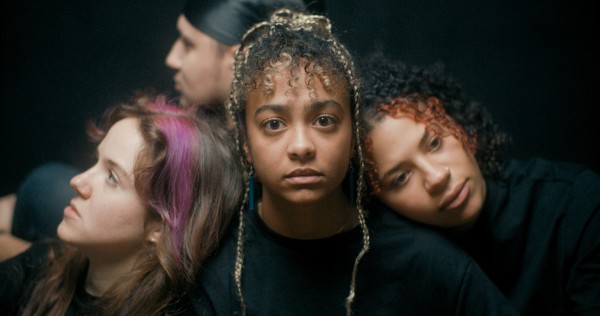In addition to 133 competition films, we will also present selected, curatorial programs in the sections "Laboratory of the Present" and "Archive of the Present". This year, we continue our focus on migrant film in Germany that we started in 2022 – and also look at two Yugoslavian filmmakers and their work in and from Germany.
>> LABORATORY OF THE PRESENT: THINKING OF GERMANY
"Thinking of Germany at night just puts all thought of sleep to flight." In reference to these lines by Heinrich Heine, which are still used today to comment on problematic political events here, the "Laboratory of the Present" takes a critical look at Germany. A subversive, activist, but also fun attitude connects the five film programs in this section. They encounter the complex German history cinematically with a polyphony of identities and cultures.
The program "Blind in the Right Eye" (curated by Florian Wüst) bundles cinematic reactions to right-wing extremist violence and structural blindness of state institutions to racism and xenophobia. "The Most Beautiful Window in the World" (Florian Wüst) collages various TV excerpts and shows how unconventional, progressive and almost activist mass communication beyond ratings could and can be in the FRG. "Oh Pleasure Up Yours!" (Mara Marxsen) is aware of the complex relationship between gender, pleasure, power and images, but at the same time celebrates pleasure in films and through films. Wild, angry films meet in the program "Everyday Life and Turmoil. Counter-Narratives from the GDR" (Conny Klauß) with pockets of resistance, descriptions of daily life and the exasperation of an exhausted society. And "We need to talk" (Sarnt Utamachote) shows the diversity of migration stories from the Asian continent to Germany and makes clear how the filmmakers position themselves in the stories they tell.
>> ARCHIVE OF THE PRESENT: BACKLIGHT
The “Archive of the Present”, curated by Tobias Hering, focuses on the Yugoslav filmmakers Irena Vrkljan and Želimir Žilnik in two programs.
In the late 1960s, Želimir Žilnik was one of the best-known directors of the "Black Wave" - a series of films that dealt critically with Yugoslav society. In the mid-1970s, he moved to Munich for some time and also put his finger on sore points in the films he made there, addressing xenophobia and structural violence in West German society. In the presence of Žilnik, we will show short films shot in Germany, some of which were long considered lost, but have recently resurfaced in various archives.
Irena Vrkljan was a poet, filmmaker, translator and radio playwright. She lived between Berlin and Zagreb for 50 years, writing and narrating about life between these worlds that did not come together and yet became inseparable. When she began studying directing at the newly founded dffb in Berlin in 1966, she was 36 and already established in Yugoslavia as a television writer and poet. The four films she made at the dffb are explorat
ions of the place by a dowser, stories of "Shadow Berlin," but also critical positionings on the politically turbulent generation to which she belonged.
The complete program will be available at festival.shortfilm.com mid/end of May.
Filmstill: FAQ (Mariama Bah, Lea Kaiser & Jonas Riedel)

